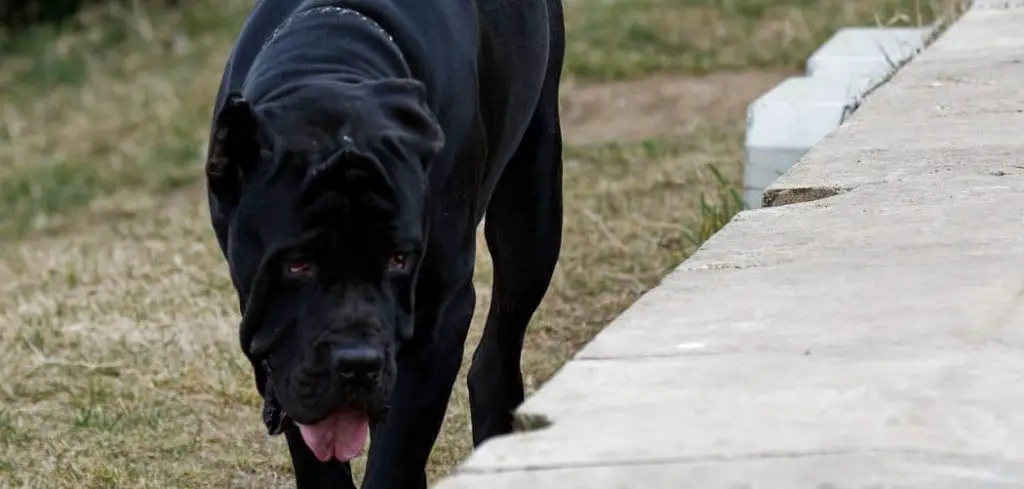Seeing your dog pant heavily after a run can be alarming, especially if it seems to go on too long.
Excessive panting might be completely normal post-exercise—or a sign that something isn’t quite right.
We outline the common causes of a dog panting excessively after running, what you can do at home, and when to seek veterinary help.
Table of Contents
Dog Panting Excessively After Running — Why It Happens
Most dogs pant after physical activity as a natural way to cool down and regulate body temperature. But when panting becomes extreme, lasts too long, or is paired with other symptoms like shaking or lethargy, it could indicate heat exhaustion, overexertion, heart strain, or underlying illness.
Certain breeds, particularly brachycephalic (flat-faced) dogs like Bulldogs or Pugs, are at higher risk of overheating and struggling to breathe after exertion.
Older dogs and those with medical conditions may also have a harder time recovering from physical activity.

Common Causes of Dog Panting Excessively After Running
Overexertion
Running too hard or for too long can lead to excessive panting.
Panting helps regulate your dog’s body temperature, but when they overdo it, their body may struggle to cool down efficiently.
You might also notice drooling, weakness, or refusal to continue walking.
Overexertion is especially common in energetic breeds like Border Collies, Labs, or Huskies who may not self-limit their activity.
If not managed, this can lead to heat exhaustion or even collapse.
Read more: Dog Panting Excessively (Here’s why)
Heat Exhaustion
Dogs are more prone to overheating than humans because they don’t sweat.
If your dog runs during hot or humid weather, even a short jog can cause their internal temperature to rise dangerously.
You may see frantic panting, bright red gums, excessive drooling, vomiting, or uncoordinated movement.
Heat exhaustion is a medical emergency and can quickly turn into heatstroke without intervention.
Brachycephalic Obstructive Airway Syndrome (BOAS)
Flat-faced breeds like Pugs, Bulldogs, Shih Tzus, and Boxers can struggle to breathe even during mild activity.
After running, their narrow airways may become obstructed, causing intense panting, snorting, or gagging.
They may also collapse or show signs of panic due to oxygen deprivation.
Dogs with BOAS should avoid strenuous exercise, especially in warm conditions.
Heart Disease
Dogs with undiagnosed heart problems may pant heavily after running due to increased strain on the heart.
Signs might include coughing, fatigue, rapid breathing at rest, or fainting after exercise.
Older dogs, large breeds, or dogs with a history of heart murmurs should be monitored closely after physical activity.
Panting may be the first visible sign that the heart isn’t coping well with the exertion.
Respiratory Issues
Conditions like laryngeal paralysis, collapsing trachea, or chronic bronchitis can make breathing difficult after exercise.
Affected dogs might pant excessively, wheeze, or make honking noises after running.
Some may show reluctance to run at all or appear distressed during recovery.
Respiratory problems often require medical diagnosis and careful management of activity levels.
Pain or Discomfort
Excessive panting after running may also signal pain, especially in dogs with arthritis, hip dysplasia, or joint strain.
Panting is a subtle sign of discomfort and might accompany stiffness, limping, or restlessness.
Older dogs or those with previous injuries might experience post-exercise inflammation or soreness, leading to heavier breathing during recovery.
What to Do If Your Dog Is Panting Excessively After Running
Start by helping your dog cool down gradually in a shaded, ventilated area.
Offer small amounts of cool (not ice-cold) water, and let them rest without additional stress or stimulation.
Avoid forcing more exercise or feeding immediately after intense activity.
If your dog pants excessively after even moderate running, limit future sessions to shorter durations and cooler parts of the day.
For flat-faced breeds or older dogs, opt for walking instead of running and monitor their breathing throughout.
If the panting doesn’t subside after 15–30 minutes, or is paired with alarming signs like vomiting, staggering, or collapsing, seek veterinary care.
When to Call or Visit Your Vet
You should contact your vet promptly if your dog:
Continues panting heavily more than 30 minutes after running
Shows signs of heat exhaustion (bright red gums, drooling, vomiting)
Collapses or refuses to stand after a run
Has pre-existing heart or respiratory conditions
Seems lethargic, disoriented, or weak
In these cases, excessive panting isn’t just from exertion—it may signal a medical emergency that needs swift attention.
Read more: Dog Panting Excessively in Heat (What’s normal and what’s not?)
Key Takeaway
Panting after a run is normal—but excessive, prolonged, or distressed breathing should never be ignored.
Watch for additional signs that point to heat exhaustion, overexertion, or an underlying health issue.
If in doubt, shorten future runs and consult your veterinarian for guidance tailored to your dog’s breed, age, and fitness level.
By understanding your dog’s limits and needs, you can keep exercise fun—and safe—for both of you.
